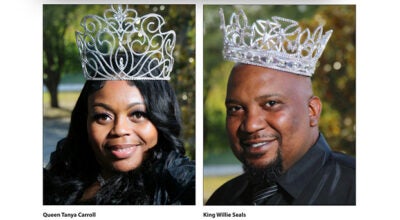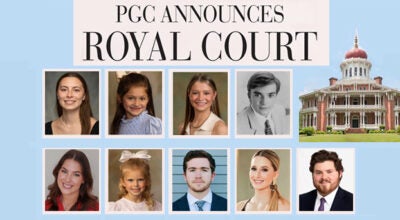Local men share memories of uncertainty while serving during Cold War
Published 3:49 pm Sunday, March 4, 2012

Sgt. Ron Schupe, from left, Lt. Col. Marvin McDonald, 1st Sgt. Allen B. Coley, Chief Warrant Officer James Waycaster and Sgt. Bob Dearing, standing in the Armory, all served with the 367th Ordnance Company of the Mississippi National Guard in 1961-1962, when the company was activated and sent to Fort Bragg, N.C., following the Berlin Crisis. The photo at Coley’s feet shows himself, his father, Allen L. Coley, and his brother, William Coley, who all served together in 1961. (Lauren Wood The Natchez Democrat)
Fifty years ago, former state senator Bob M. Dearing and former mayor Tony Byrne sat across from each other on a road trip back to Natchez from LSU when JFK’s voice delivered some news that could have potentially changed Dearing’s life — or ended it.
“John F. Kennedy came on the air and said the (U.S.) National Guard reserve, (U.S.) Army Reserve, (U.S.) Navy Reserve and (U.S.) Air Force reserve would go to active duty because of the Berlin Crisis,” Dearing said.
It was the summer of 1961.
“I never will forget that.”
Dearing was in his third year of duty in the U.S. National Guard, after spending only six months on active duty in his first year with the Guard.

Submitted photo — The 367th Ordinance Co. reported to summer training at Camp Shelby in Hattiesburg in the summer of 1961, before being transferred to Fort Bragg for more than a year. John F. Kennedy activated members of the U.S. National Guard, including the unit in Natchez, in response to the Berlin Crisis. This photo, submitted by Bob Dearing, was taken July 29, 1961. In the first row, from left, are, Allen L. Coley, Claude “Andy” Pressgrove, James Waycaster, Roland Slover, Gordon Hughes, Ivy Bennett, Rayford Huff, Herman Moore and Marvin McDonald; second row: Denver Freeman, Bennie Thorton, William Wilkes, John Dollar, Harry Greer, Willis Smith, James Smith, George Bunch, Allen B. Coley, John McCall, Roland “Ronnie” Shupe, Morris Sullivan, Charles Tynes and Robert Ashley; third row, Jimmie Brewer, Daniel McCall, Clyde Rodriguez, Gene Smith, Carroll Ashcraft, Robert “Bob” Dearing, Arnold Golman, Leslie Hebert, Robert Hoggatt and James Lambert Jr.; fourth row, Floyd Leach, Samuel Lewis, David Daniels Jr., James Dunn, Julius Nettles, Whitney Hebert, James Rehms, Curtis White Jr., Thomas Ballard Jr., Walter Barker Jr., Joseph Baroni, William Coley, William Magee and Thomas Martin; fifth row, Herman Porter, Reagon Randall, Benjamin Ray, Charles Seyfarth Jr., Newell Smith, William Tate Jr., Bennie Thornton, James Jones, James King, Anthony Feduccia, Stephen Gammill, Joseph Feduccia, Jerry Stallings, William Nelson and Kenneth Watson.
He joined the National Guard shortly after he received another message from folks in Washington, D.C., a few years before.
“(The letter) starts out, as they all did — ‘Greetings, you have been drafted.’”
When Dearing first got word he was drafted, James Waycaster convinced him to join the National Guard rather than try his luck in the U.S. Army infantry.
National Guard was a six-year obligation, but it required only six months of active duty.
But a few years later, on that day in the car with Byrne, Dearing learned his time wasn’t up.
“I told Tony, I don’t think ours will be called up because we’re advanced in age,” Dearing said.
“But low and behold, two weeks later, we were activated.”
Dearing and 97 other men from the Miss-Lou received their notice to report to Fort Bragg, N.C., for one year.
“It’s hard to believe it’s been 50 years,” Marvin McDonald said.
McDonald was serving as the band director at Fayette High School when he was activated and sent to Fort Bragg.
“It seems like yesterday.”
The men were part of the 367th ordinance infantry battalion company — a collection of mostly young men and some middle aged men from Natchez and other places in the Miss-Lou.
Some of the men, like Ronnie Shupe, joined the National Guard for the monthly pay he earned while taking college classes. Others, like Dearing, thought volunteering for the Guard provided a better alternative than being drafted into a possible war.
But when the unit was activated, the National Guard unit from Natchez was considered RA, or regular Army.





